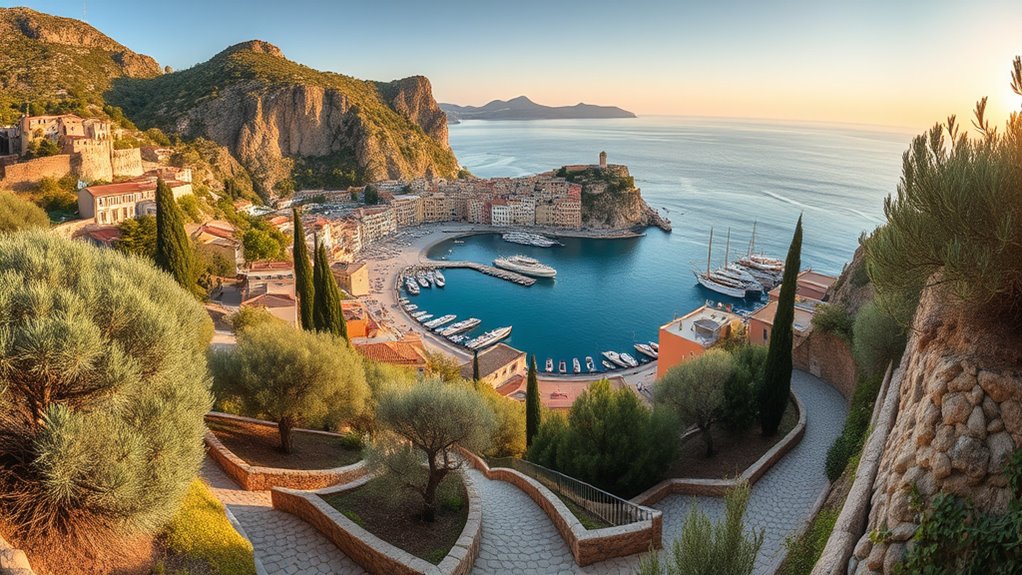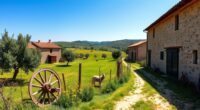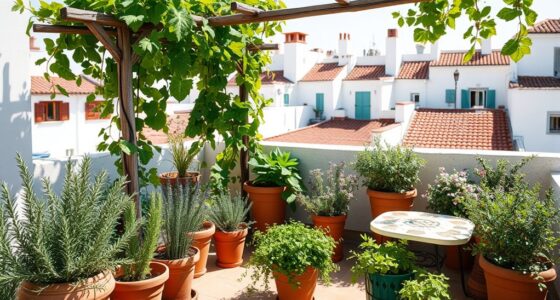To immigrate or retire in Sardinia, you need to understand residency, visa, and housing rules. Register your address within 8 days of arrival and prove your accommodation with a rental or property deed. Obtain the right visa, secure health coverage, and demonstrate financial stability with bank statements and income. Building legal residence takes time, and Italian language skills help integration. Keep exploring the details to facilitate a smooth transition and long-term stay in this beautiful island.
Key Takeaways
- Register your local address at the police station within 8 days of arrival, using rental contracts or property deeds as proof.
- Obtain a valid visa if staying over 90 days, and apply for a residence permit within 8 days of entering Italy.
- Demonstrate legal residence through registered rental agreements or property ownership, along with a Codice Fiscale (Tax ID).
- Show proof of financial stability, health insurance, and a clean criminal record to qualify for long-term residence or citizenship.
- Learn Italian (at least A2 or B1 level) and integrate culturally to ease settlement and meet residency requirements.
Understanding Residency Requirements in Sardinia
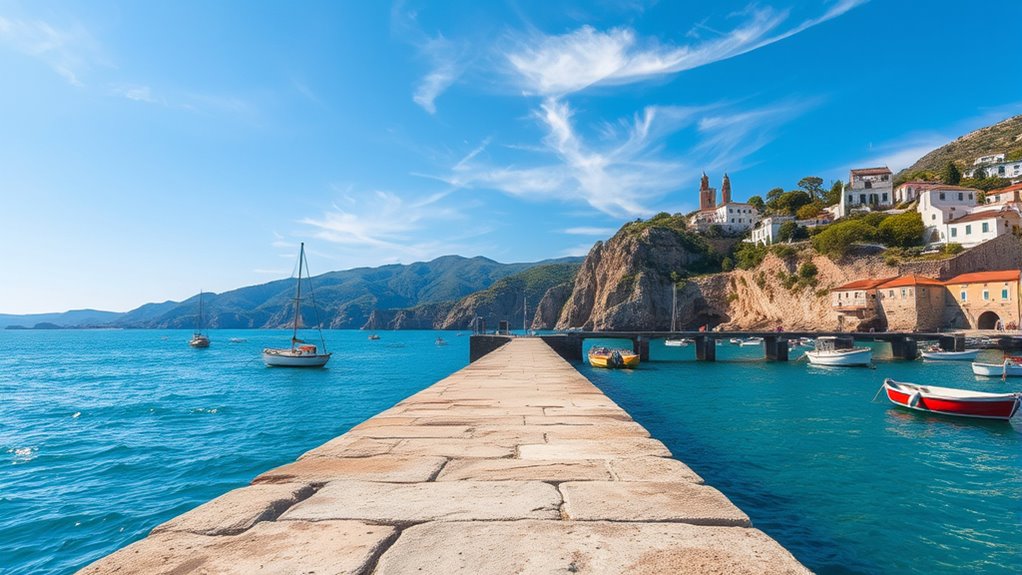
Understanding residency requirements in Sardinia is essential if you plan to live there long-term. You must register your local address within 8 days of arriving at the police station (Questura). This registration, called iscrizione anagrafica, is mandatory for stays longer than 90 days and provides access to healthcare, banking, and other services. To register, you’ll need proof of housing, like a rental contract or utility bill. This step formalizes your residency with the local municipality and is a prerequisite for applying for a residence permit if you’re a non-EU national. Maintaining continuous proof of residence is vital, especially during permit renewal. Additionally, you must be physically present in Italy at least 51% of the time to validate your residency and qualify for citizenship after five years. A thorough understanding of local registration procedures, including projector technology, can help facilitate integration into your new community.
Navigating Visa and Entry Regulations for Long-Term Stays
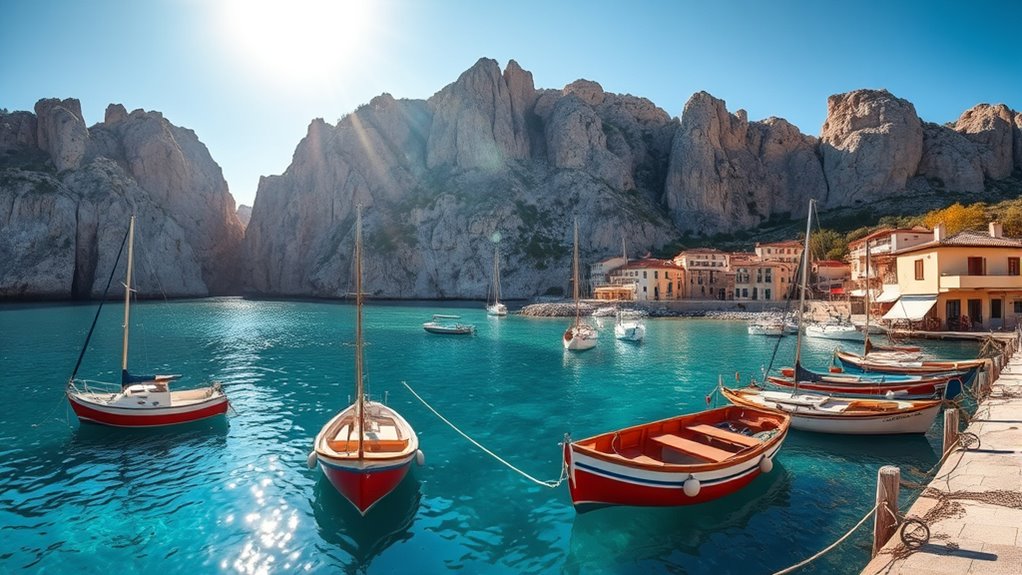
To stay long-term in Sardinia, you’ll need to understand the visa requirements and gather the necessary entry documents. It’s important to follow the application process carefully and verify all forms and supporting papers are complete and accurate. Once you have your visa, knowing what documentation to carry on arrival will help make your entry smooth and hassle-free. Application submission must be done through mail to the designated Visa Office, and incomplete applications are not accepted, so thorough preparation is essential. Additionally, being aware of essential documentation for entry can help prevent delays or complications during your arrival process.
Visa Requirements Overview
Charting visa and entry regulations for long-term stays in Sardinia involves understanding the different visa types, requirements, and application procedures. You’ll need a visa if planning to stay over 90 days, with biometric submissions starting January 2025. Common options include work, study, family reunification, elective residence, and investor visas. Elective residence suits retirees with stable income and no employment plans, requiring proof of €31,000+ annual income. Investor visas demand minimum investments between €250,000 and €2 million, granting initial residence and work rights for two years. Initial visas are valid for one year and renewable annually, provided conditions are met. Applications are submitted at authorized post offices, with necessary documentation like proof of funds, housing, and health coverage. Golden Visas require additional investment and background checks. Visa eligibility also includes demonstrating property ownership or rental agreements, as well as proof of economic resources and health insurance coverage, which are essential for approval. Additionally, understanding the application procedures can streamline the process and ensure compliance with all legal requirements.
Entry Documentation Essentials
When planning a long-term stay in Sardinia, guaranteeing you have the correct entry documentation is essential for a smooth arrival and legal residence process. Your passport must be valid for at least three months beyond your planned departure. Carry both the original passport and copies, as authorities may request to see them. Depending on your country of origin, you might need additional documents, such as a return ticket. Non-EU visitors staying less than 90 days must declare their presence at the local police station within eight days of arrival, and hosts may need to submit a hospitality declaration. For stays over 90 days, you must apply for a residence permit within eight days of entry. Always verify specific requirements with embassies or consulates before departure to ensure compliance. Ensuring your documentation aligns with entry regulations can help prevent delays or complications during your stay.
Securing a Work Permit or Investment Visa in Sardinia

Securing a work permit or investment visa in Sardinia involves a clear process that requires careful preparation and compliance with Italian regulations. Your employer must be registered with the Italian Ministry of Labor and Social Policies to sponsor your visa. They need a digital domicile (PEC), submit a housing suitability certificate, and sign an electronic “stay contract” outlining employment terms. Before hiring you, they must obtain preliminary clearance from the provincial employment office, proving no suitable local candidates exist. As an employee, you’ll need a type D national visa for long stays, obtained from the Italian consulate before arriving. Once in Italy, you’ll apply for a residence permit within eight days. Processing takes around 2-3 months, with biometric fingerprinting and registration at the local police headquarters. Utilizing the appropriate application process and ensuring all documentation is complete can help streamline your entry and residence procedures.
Establishing Legal Housing and Demonstrating Financial Stability
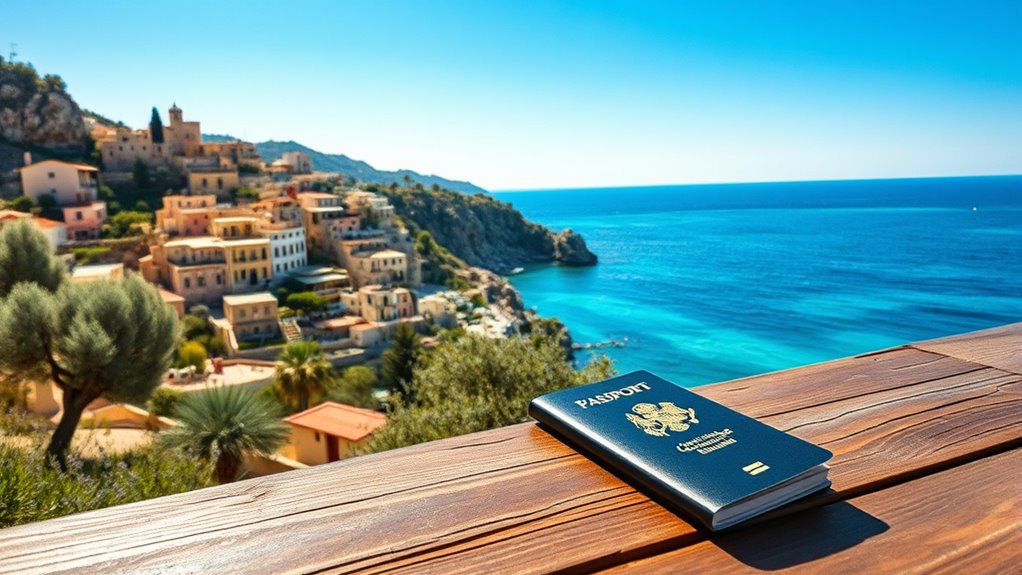
To establish legal housing in Sardinia, you’ll need to provide proof of residence, such as a rental contract or property deed, along with a valid Italian Tax ID. Demonstrating financial stability through bank statements and income documentation is essential for residency and mortgage applications. Ensuring your housing arrangements and financial documents meet legal requirements will help secure your stay and smooth your progression. Additionally, it’s important to verify that your documents are up-to-date and accurately reflect your current status, as signs of spoilage in documents can delay approval processes.
Proof of Residency
Establishing legal residency in Sardinia requires proving your housing arrangement and financial stability through specific documentation. You must submit a declaration of residence at your local municipality (*Comune*), along with proof of your housing, such as a rental contract or official correspondence linked to your address. A valid passport or ID is necessary for the application. The municipality verifies your residence within 45 days, often through a home check conducted by local police. For non-EU citizens, residency permits or application receipts are also required. It is important to ensure that all documents are up-to-date and correctly translated if necessary, as incomplete submissions can delay or jeopardize your registration. Additionally, emotional manipulation or undue influence should be carefully considered when gathering documentation to ensure authenticity and compliance. Confirm your documents are complete and accurate, as incomplete submissions can delay or jeopardize your registration. Once approved, your residency becomes legally binding, granting access to healthcare, social services, and other benefits tied to your legal address in Sardinia.
Financial Documentation
Are you prepared to demonstrate your financial stability and legal residence when applying for residency in Sardinia? You’ll need solid documentation to prove your income and asset sources. This includes bank statements, tax returns, and payslips that confirm your ability to support yourself. A Codice Fiscale is essential for managing your taxes and financial transactions. Additionally, proof of legal address—like rental contracts or utility bills—is required, though specifics are discussed elsewhere. Be ready to submit a clean criminal record and health insurance proof covering Italian healthcare.
| Document Type | Purpose |
|---|---|
| Bank Statements | Show income and savings |
| Tax Certificates | Verify legal earnings |
| Income Statements | Demonstrate ongoing support |
| Health Insurance | Confirm healthcare coverage |
| Residency Proof | Establish legal address |
Housing Requirements
Securing long-term housing in Sardinia requires you to provide official proof of accommodation, such as a rental contract or property deed. You must have a minimum one-year rental agreement registered with the local authorities, or own property with a registered deed, to demonstrate stable housing. Rental contracts and deeds must be officially registered with Italian agencies and be in Italian. Temporary stays like hotels or short-term rentals aren’t accepted as proof. Establishing residency involves registering your housing with the local municipality (anagrafe). Foreigners can buy property in Italy if reciprocity exists, which applies to U.S. citizens. Ownership strengthens your application, but proper registration and translation of documents are essential. Meeting minimum habitability standards ensures your residence qualifies for visa and residency purposes. Proper registration with the local authorities is crucial for legal residency and to avoid potential legal issues. Additionally, ensuring your property complies with lifestyle standards can facilitate a smoother integration process.
Pathways to Citizenship and Long-Term Residency

To become a citizen or long-term resident in Sardinia, you need to navigate a structured process that involves meeting specific legal, financial, and language requirements. For citizenship by residency, you must reside legally and continuously in Italy, demonstrate stable income, show valid accommodation, and maintain a clean criminal record. Starting in 2025, B1-level Italian proficiency is required. Citizenship by descent now limits eligibility to those with parents or grandparents born in Italy, excluding more distant ancestors. The application process involves submitting requests to local authorities or consulates, with shorter residency requirements for descendants. Long-term residence permits require continuous residence, stable income, and no serious criminal record, offering the chance for eventual citizenship. Marriage to an Italian citizen also provides a pathway after two years of residence in Italy. Additionally, Italy permits dual citizenship, allowing individuals to retain their original nationality upon acquiring Italian citizenship. Understanding industry trends can help applicants better prepare their applications and increase their chances of success.
Cultural Integration and Language Considerations
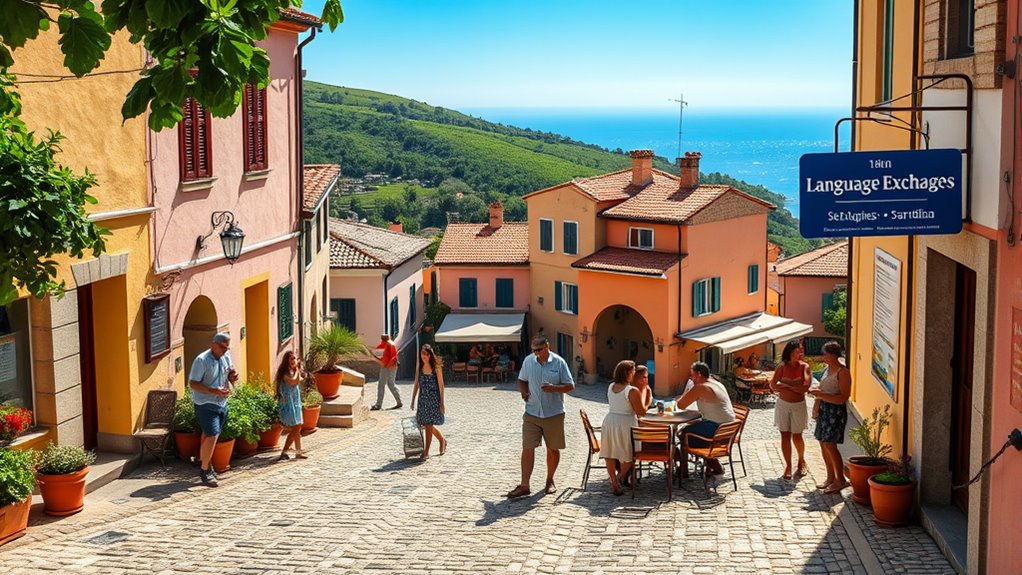
How does cultural integration shape your experience in Sardinia? It influences how connected you feel and how easily you settle in. Sardinian society values its identity, blending local language and customs with new influences. Language proficiency in Italian is essential for accessing services and building relationships, while Sardinian (Sardu) reflects regional pride but isn’t often used in formal settings. To bridge gaps, multilingual programs in schools support migrants’ language skills and cultural exchange. Additionally, the region actively promotes intercultural initiatives, recognizing that migration influx has enriched local traditions and fostered a more diverse community. This ongoing process of cultural adaptation helps newcomers find their place within the community. Here’s a quick overview:
| Aspect | Key Point | Impact |
|---|---|---|
| Population Growth | Foreigners increased from 0.7% to 3.2% | More diverse communities |
| Education | Focus on language and inclusion | Facilitates integration |
| Social Perception | Solidarity but occasional tensions | Challenges and community activism |
| Language Skills | Italian essential; Sardinian cultural | Affects access and social ties |
| Identity | Strong local identity, evolving | Shapes newcomers’ sense of belonging |
Practical Tips for Making Sardinia Your Permanent Home
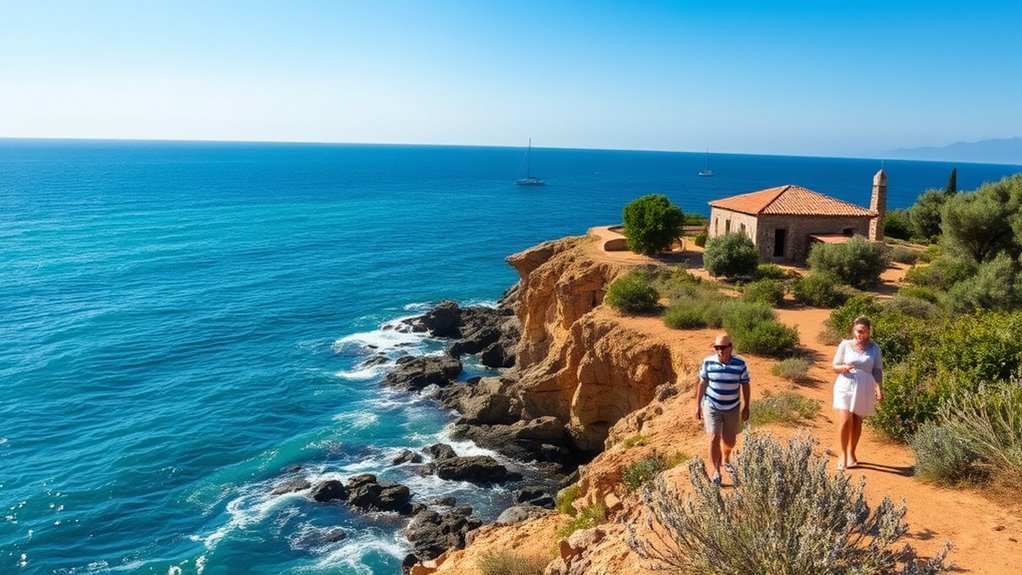
Successfully settling in Sardinia as a permanent resident involves understanding the practical steps required to meet legal and logistical requirements. First, ensure you’ve lived in Italy for at least five consecutive years, with no absences over six months (or ten months total) unless for documented reasons. You’ll need proof of income exceeding the annual threshold (€6,079.45 in 2022), a valid passport, housing documents, and payment receipts for fees. Learning Italian to at least A2 level is mandatory unless exemptions apply. Secure suitable accommodation that meets regional standards, whether leased or owned. Additionally, demonstrate stable income and comply with local tax obligations. Maintaining your residence requires compliance with residence and employment regulations. Preparing these documents and meeting these criteria facilitate your path to permanent residence, making Sardinia your true home.
Frequently Asked Questions
Can I Bring My Family Members When Immigrating to Sardinia?
Yes, you can bring your family members when immigrating to Sardinia if you hold a valid residence permit for at least one year. You need to apply for family reunification online through Italy’s immigration platform, providing proof of income, housing, and relationship documents. Once approved, your family members will receive a visa allowing them to join you legally in Sardinia, as long as your residence permit remains valid.
Are There Special Visa Programs for Retirees Relocating to Sardinia?
Did you know Italy welcomes thousands of retirees annually? For relocating to Sardinia, you can apply for the Italy Elective Residence Visa, ideal if you have a passive income of around €31,000–€32,000 yearly. This visa allows you to settle without working, and you can include family members. Just guarantee you meet income, health insurance, and accommodation requirements, making your retirement dream in Sardinia achievable.
What Are the Healthcare Access Options for New Residents in Sardinia?
You have several healthcare access options in Sardinia. Register with the Servizio Sanitario Nazionale (SSN) to get extensive public healthcare, including a local GP and specialist referrals. If you’re an EU citizen, use your EHIC for short-term care and register for long-term services. Non-EU nationals might need an S1 form. For quicker, broader services, consider private health insurance or private clinics, which often offer faster care and specialized treatments.
How Long Does the Residence Permit Approval Process Typically Take?
You’re wondering how long it takes to get a residence permit. Generally, the process can take anywhere from 3 to 6 months, depending on the type of permit. You’ll need to submit your application promptly and wait for processing, which includes document verification, residence checks, and approval times. Keep in mind that delays like home visits or administrative backlogs can extend this timeframe, so plan accordingly.
Are There Language Courses Available Specifically for New Immigrants in Sardinia?
Think of Sardinia as a welcoming harbor for newcomers. You’ll find many language courses tailored for new immigrants, like those at CPIA and private schools in cities like Cagliari and Olbia. These programs include group, individual, and immersive options, often with certificates that support your residency and integration. Whether you want cultural insights or practical language skills, Sardinia’s educational offerings are designed to help you settle in smoothly.
Conclusion
So, whether you’re chasing the sun or escaping the 9-to-5 grind, Sardinia’s waiting with open arms—and plenty of paperwork. Just remember, turning paradise into your permanent address isn’t as simple as a postcard, but hey, at least you’ll have stunning beaches and a new accent to show for it. So go ahead, plunge into, and embrace the chaos—after all, what’s life without a little adventure (and a lot of bureaucracy)?
